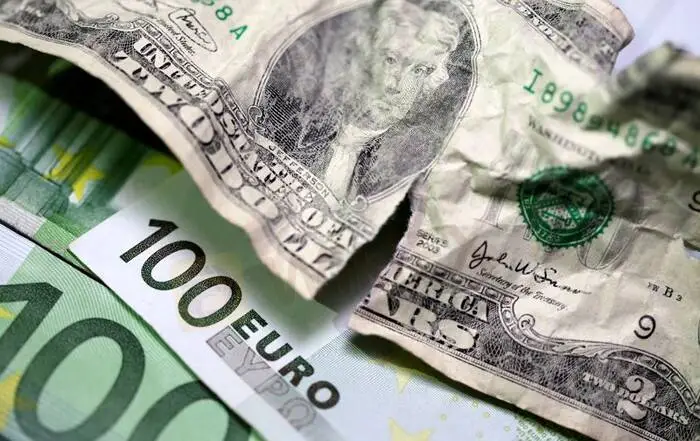简体中文
繁體中文
English
Pусский
日本語
ภาษาไทย
Tiếng Việt
Bahasa Indonesia
Español
हिन्दी
Filippiiniläinen
Français
Deutsch
Português
Türkçe
한국어
العربية
Dollar set for bruising week after ECB and BOE get more hawkish
Abstract:The dollar index was heading for its worst week in nearly two years on Friday as the euro held firm at a three-week high and sterling gained after hawkish shifts from the European Central Bank and the Bank of England.

The index, which measures the greenback against six major peers was at a three-week low of 95.271, having tumbled 2% this week – its biggest such fall since March 2020.
That follows sharp gains for the dollar last week as traders rejigged positions preparing for faster Federal Reserve rate hikes than had been previously expected, with about five hikes this year now being factored in.
“On the face of it, both the (Bank of England) and ECB met market expectations with BoE raising rates 25bps to 0.50% and ECB keeping policy unchanged. However, both meetings unveiled substantial hawkish shifts,” said Westpac analysts in a note.
The euro was at $1.1452, its highest since Jan. 14, after ECB president Christine Lagarde acknowledged mounting inflation risks and declined to repeat previous guidance that an interest rate increase this year was extremely unlikely.
This marked a sharp turnaround for what had been one of the worlds most dovish central banks.
“It‘s not unreasonable to conclude that the peak of the Fed-ECB policy divergence is past us,” said ING analysts, adding that since the different policy stances of the two central banks had been driving market moves it was possible that last week’s low for the euro marked its bottom in this cycle.
Sterling was at $1.3604 having risen to a two-week top of $1.6326 on Thursday. In addition to the BoEs 25 basis points rate hike, nearly half of its policymakers wanted a bigger increase to contain rampant inflation.
The Aussie dollar was at $0.7143, unaffected by a statement from the Reserve Bank of Australia which sharply revised up its outlook for inflation though said it was content to keep policy super loose as it seeks a lasting recovery in wages and living standards.
The yen was at 114.98 per dollar, as the yield on benchmark 10- and five-year Japanese government bonds climbed to six-year highs in early Tokyo trading, with analysts starting to speculate that even the Bank of Japan might have to follow peers and tighten monetary policy.
U.S. non-farm payroll data is due later Friday, but the data wont be as crucial for the Fed as in the past, as the focus is more on inflation rather than full employment.

Disclaimer:
The views in this article only represent the author's personal views, and do not constitute investment advice on this platform. This platform does not guarantee the accuracy, completeness and timeliness of the information in the article, and will not be liable for any loss caused by the use of or reliance on the information in the article.
Read more

Webull and Others Fined $275,000 for Incomplete Suspicious Activity Reports
Webull Financial, alongside Lightspeed Financial Services Group and Paulson Investment Company, LLC, has agreed to pay a collective fine of $275,000 following an investigation by the US Securities and Exchange Commission (SEC). The penalty was issued due to the firms’ failure to include essential information in suspicious activity reports (SARs) over a four-year period.

Barclays Resolves £40M Fine Over 2008 Fundraising Disclosure Failures
Barclays has reached a settlement with the UK’s Financial Conduct Authority (FCA), agreeing to pay a £40 million fine for failing to adequately disclose arrangements with Qatari investors during its critical fundraising efforts amidst the 2008 financial crisis.

WikiEXPO Global Expert Interview: Advanced Practices and Insights in Financial Regulation
In the midst of rapid advancements and evolving landscapes in financial technology, financial regulation, and ensuring financial security, WikiGlobal stands at the forefront, closely tracking these transformative trends. As we embark on our series of exclusive interviews focusing on these pivotal areas, we are delighted to have had an in-depth conversation with.

Alleged Concerns with TradeEU.global's Trading Practices
An individual trader has come forward with allegations of an unfavourable experience while using the services of the broker TradeEU.global.
WikiFX Broker
Latest News
Saxo & Portuguese Bank Partnership
SEC Fines Broker-Dealers $275K for Incomplete SAR Filings
Elon Musk Warns of Imminent US Bankruptcy | Bitcoin Retreats from $100K
UK FCA Fines Barclays £40 Million Over 2008 Deal
WikiEXPO Global Expert Interview: Advanced Practices and Insights in Financial Regulation
Justin Sun Invests $30M in Trump-Backed World Liberty Financial
Lured by False Promises: Malaysian Driver Lost RM218K to an Investment Scam
FTX Sets March 2025 Timeline for Creditor Payouts: What It Means for Investors
What is an Economic Calendar? How it works
Pros & Cons of Automated Forex Trading
Currency Calculator



